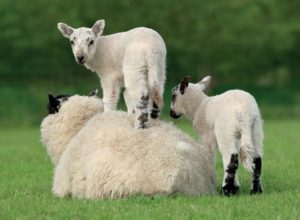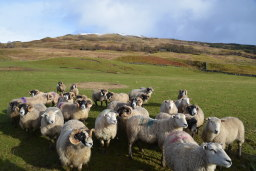Hypomagnesaemia (Staggers) In Sheep
26 February 2018
Beware of staggers (hypomagnesaemia) in sheep, when they are being turned out to quick growing grass in the spring. Sheep are most exposed at peak lactation, which is 30-40 days post lambing.
Staggers is a metabolic disorder caused by low levels of blood magnesium. Magnesium is an essential element for sheep for skeletal and muscle functions as well as enzyme and nervous system functionality. Sheep cannot store magnesium, meaning they need a continuous supply of the element.
There are numerous causes of staggers, the most common is stress from either weather or moving fields and high K being applied to the field by means of bagged fertiliser. The stress of poor weather often makes the ewe take her lambs in to shelter, where there is limited food, resulting in a restricted intake, which leads to inadequate absorption of Magnesium. Magnesium is available from herbage and forage, but this availability reduces when Nitrogen and Potassium levels increase. Magnesium levels are higher in clover than they are in grasses, high Nitrogen applications can supress the clover which can lead to a lower availability of magnesium in the herbage in the spring.
The first sign of staggers is usually sudden death, this should trigger action to protect the rest of the flock. Simple management changes can include the following,
- Offer supplementary feed that is high in fibre, this can assist with slowing down digestion and increase the length of time food is in the intestine for magnesium absorption. Offering feed such as hay in the field also offers a place for the ewe and lambs to shelter, allowing her to eat while sheltering from poor weather.
- Routine soil analysis shows the Magnesium level of soil. Use of Magnesian limestone rather than Calcium limestone, maintains the levels. However, the efficiency decreases as the soil pH increases e.g. soil over pH6.5 use alternative source of magnesium.
- Modify bagged fertiliser applications so K applications are carried out later in the season.
- A regular supply of Magnesium in the diet e.g. offer free access minerals.
Kirsten Williams, kirsten.williams@sac.co.uk
Sign up to the FAS newsletter
Receive updates on news, events and publications from Scotland’s Farm Advisory Service

